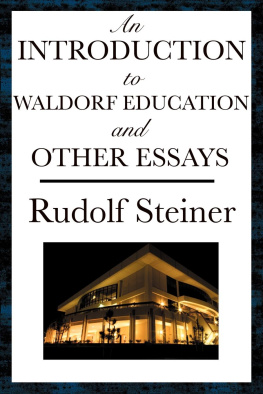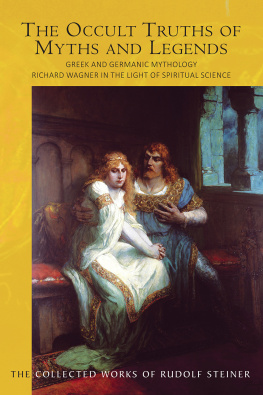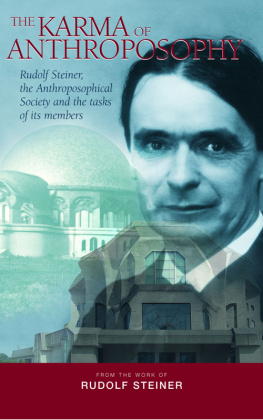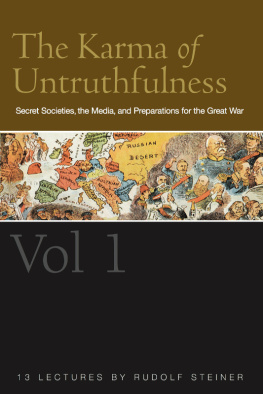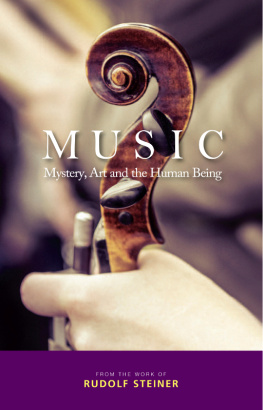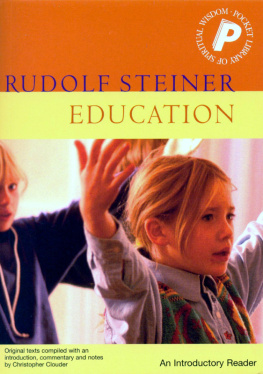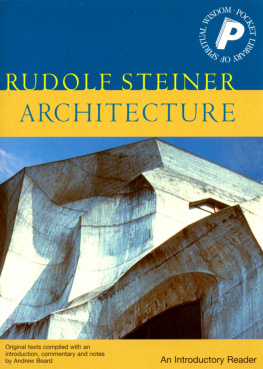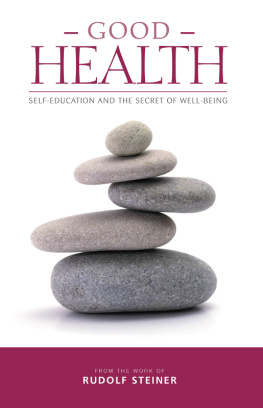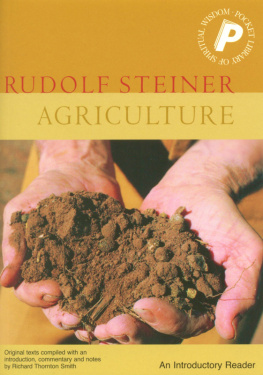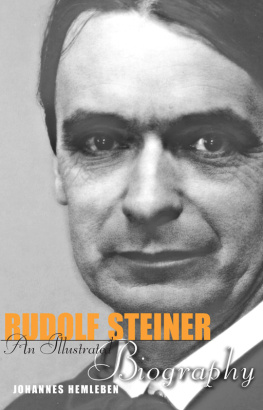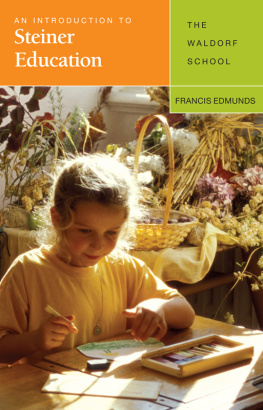Rudolf Steiner - An Introduction to Waldorf Education and Other Essays
Here you can read online Rudolf Steiner - An Introduction to Waldorf Education and Other Essays full text of the book (entire story) in english for free. Download pdf and epub, get meaning, cover and reviews about this ebook. year: 2013, publisher: Start Publishing LLC, genre: Science. Description of the work, (preface) as well as reviews are available. Best literature library LitArk.com created for fans of good reading and offers a wide selection of genres:
Romance novel
Science fiction
Adventure
Detective
Science
History
Home and family
Prose
Art
Politics
Computer
Non-fiction
Religion
Business
Children
Humor
Choose a favorite category and find really read worthwhile books. Enjoy immersion in the world of imagination, feel the emotions of the characters or learn something new for yourself, make an fascinating discovery.
- Book:An Introduction to Waldorf Education and Other Essays
- Author:
- Publisher:Start Publishing LLC
- Genre:
- Year:2013
- Rating:5 / 5
- Favourites:Add to favourites
- Your mark:
- 100
- 1
- 2
- 3
- 4
- 5
An Introduction to Waldorf Education and Other Essays: summary, description and annotation
We offer to read an annotation, description, summary or preface (depends on what the author of the book "An Introduction to Waldorf Education and Other Essays" wrote himself). If you haven't found the necessary information about the book — write in the comments, we will try to find it.
Collected here are fourteen essays by Rudolf Steiner covering subjects such as Waldorf Education, The Reordering of Society, The Human Soul, Karma, and Knowledge. These essays are informative and lively. Rudolf Steiner was an Austrian philosopher, literary scholar, educator, artist, playwright, social thinker, and esotericist. His contributions to society were immense.
An Introduction to Waldorf Education and Other Essays — read online for free the complete book (whole text) full work
Below is the text of the book, divided by pages. System saving the place of the last page read, allows you to conveniently read the book "An Introduction to Waldorf Education and Other Essays" online for free, without having to search again every time where you left off. Put a bookmark, and you can go to the page where you finished reading at any time.
Font size:
Interval:
Bookmark:
By Rudolf Steiner
The aims Emil Molt is trying to realize through the Waldorf School are connected with quite definite views on the social tasks of the present day and the near future. The spirit in which the school should be conducted must proceed from these views. It is a school attached to an industrial undertaking. The peculiar place modern industry has taken in the evolution of social life in actual practice sets its stamp upon the modern social movement. Parents who entrust their children to this school are bound to expect that the children shall be educated and prepared for the practical work of life in a way that takes due account of this movement. This makes it necessary, in founding the school, to begin from educational principles that have their roots in the requirements of modern life. Children must be educated and instructed in such a way that their lives fulfill demands everyone can support, no matter from which of the inherited social classes one might come. What is demanded of people by the actualities of modern life must find its reflection in the organization of this school. What is to be the ruling spirit in this life must be aroused in the children by education and instruction.
It would be fatal if the educational views upon which the Waldorf School is founded were dominated by a spirit out of touch with life. Today, such a spirit may all too easily arise because people have come to feel the full part played in the recent destruction of civilization by our absorption in a materialistic mode of life and thought during the last few decades. This feeling makes them desire to introduce an idealistic way of thinking into the management of public affairs. Anyone who turns his attention to developing educational life and the system of instruction will desire to see such a way of thinking realized there especially. It is an attitude of mind that reveals much good will. It goes without saying that this good will should be fully appreciated. If used properly, it can provide valuable service when gathering manpower for a social undertaking requiring new foundations. Yet it is necessary in this case to point our how the best intentions must fail if they set to work without fully regarding those first conditions that are based on practical insight.
This, then, is one of the requirements to be considered when the founding of any institution such as the Waldorf School is intended. Idealism must work in the spirit of its curriculum and methodology; but it must be an idealism that has the power to awaken in young, growing human beings the forces and faculties they will need in later life to be equipped for work in modern society and to obtain for themselves an adequate living.
The pedagogy and instructional methodology will be able to fulfill this requirement only through a genuine knowledge of the developing human being. Insightful people are today calling for some form of education and instruction directed not merely to the cultivation of one-sided knowledge, but also to abilities; education directed not merely to the cultivation of intellectual faculties, but also to the strengthening of the will. The soundness of this idea is unquestionable; but it is impossible to develop the will (and that healthiness of feeling on which it rests) unless one develops the insights that awaken the energetic impulses of will and feeling. A mistake often made presently in this respect is not that people instill too many concepts into young minds, but that the kind of concepts they cultivate are devoid of all driving life force. Anyone who believes one can cultivate the will without cultivating the concepts that give it life is suffering from a delusion. It is the business of contemporary educators to see this point clearly; but this clear vision can only proceed from a living understanding of the whole human being.
It is now planned that the Waldorf School will be a primary school in which the educational goals and curriculum are founded upon each teacher's living insight into the nature of the whole human being, so far as this is possible under present conditions. Children will, of course, have to be advanced far enough in the different school grades to satisfy the standards imposed by the current views. Within this framework, however, the pedagogical ideals and curriculum will assume a form that arises out of this knowledge of the human being and of actual life.
The primary school is entrusted with the child at a period of its life when the soul is undergoing a very important transformation. From birth to about the sixth or seventh year, the human being naturally gives himself up to everything immediately surrounding him in the human environment, and thus, through the imitative instinct, gives form to his own nascent powers. From this period on, the child's soul becomes open to take in consciously what the educator and teacher gives, which affects the child as a result of the teacher's natural authority. The authority is taken for granted by the child from a dim feeling that in the teacher there is something that should exist in himself, too. One cannot be an educator or teacher unless one adopts out of full insight a stance toward the child that takes account in the most comprehensive sense of this metamorphosis of the urge to imitate into an ability to assimilate upon the basis of a natural relationship of authority. The modern world view, based as it is upon natural law, does not approach these fact of human development in full consciousness. To observe them with the necessary attention, one must have a sense of life's subtlest manifestations in the human being. This kind of sense must ran through the whole an of education; it must shape the curriculum; it must live in the spirit uniting teacher and pupil. In educating, what the teacher does can depend only slightly on anything he gets from a general, abstract pedagogy: it must rather be newly born every moment from a live understanding of the young human being he or she is teaching. One may, of course, object that this Lively kind of education and instruction breaks down in large classes. This objection is no doubt justified in a limited sense. Taken beyond those limits, however, the objection merely shows that the person who makes it proceeds from abstract educational norms, for a really living an of education based on a genuine knowledge of the human being carries with it a power that rouses the interest of every single pupil so that there is no need for direct individual work in order to keep his attention on the subject. One can put forth the essence of one's teaching in such a form that each pupil assimilates it in his own individual way. This requires simply that whatever the teacher does should be sufficiently alive. If anyone has a genuine sense for human nature, the developing human being becomes for him such an intense, Living riddle that the very attempt to solve it awakens the pupil's living interest empathetically. Such empathy is more valuable than individual work, which may all too easily cripple the child's own initiative. It might indeed be asserted again, within limitations that large classes led by teachers who are imbued with the life that comes from genuine knowledge of the human being, will achieve better results than small classes led by teachers who proceed from standard educational theories and have no chance to put this life into their work.
Not so outwardly marked as the transformation the soul undergoes in the sixth or seventh year, but no less important for the art of educating, is a change that a penetrating study of the human being shows to take place around the end of the ninth year. At this time, the sense of self assumes a form that awakens in the child a relationship to nature and to the world about him such that one can now talk to him more about the connections between things and processes themselves, whereas previously he was interested almost exclusively in things and processes only in relationship to man. Facts of this kind in a human being's development ought to be most carefully observed by the educator. For if one introduces into the child's world of concepts and feelings what coincides just at that period of life with the direction taken by his own developing powers, one then gives such added vigor to the growth of the whole person that it remains a source of strength throughout life. If in any period of life one works against the grain of these developing powers, one weakens the individual.
Font size:
Interval:
Bookmark:
Similar books «An Introduction to Waldorf Education and Other Essays»
Look at similar books to An Introduction to Waldorf Education and Other Essays. We have selected literature similar in name and meaning in the hope of providing readers with more options to find new, interesting, not yet read works.
Discussion, reviews of the book An Introduction to Waldorf Education and Other Essays and just readers' own opinions. Leave your comments, write what you think about the work, its meaning or the main characters. Specify what exactly you liked and what you didn't like, and why you think so.

